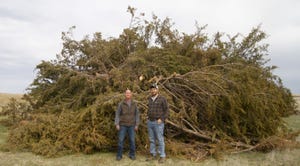Farmer suicide rates higher than veterans’
July 19, 2016

I recently read a troubling article written by Max Kutner for News Week, which cited a Center of Disease Control (CDC) study that showed the rates of suicide among farmers is greater than the self-imposed deaths of military veterans.
We know that veteran suicide is a growing problem here in the U.S. A new report from the Department of Veterans Affairs (VA) shows the suicide rate for veterans is higher than previously estimated.
According to Kutner, “The VA analysis analyzed data from more than 55 million veteran records in 50 states between 1979 and 2014. It found that the group of veterans with the highest suicide rate was males 18 to 29, with 85.64 suicide deaths per 100,000 people. (That means for every 100,000 veterans, roughly 86 die by suicide.) For women in that age group, the rate was 32.74 per 100,000. The suicide rate for all veterans in 2014 was 35.3 per 100,000.”
Kutner pointed out that an unrelated CDC study revealed that farmers are committing suicide at a higher rate than veterans. He writes, “The unrelated CDC study, published July 1, used 2012 data culled from the National Violent Death Reporting System, which tracked information on violent deaths in 17 states. It found that men who work in the farming, fishing and forestry industries had a suicide rate of 90.5 per 100,000 people, the highest of any occupational group. (The rate for women could not be calculated because there were not enough women in that group who died by suicide.)”
To put things into perspective, the rate of suicide for the average adult population is 15.2 per 100,000 people in 2014.
So what is causing farmers, and others whose livelihoods come from the land, to end their lives so tragically? While agriculture is an amazing industry to be a part of, this career field also comes with plenty of stressors. The risks of putting in a crop or raising livestock are great. Weather can greatly impact success or failure. Volatile markets can swing in the wrong direction. The stress of hanging onto a multi-generation ranch is huge, and supporting a family on a farmers’ income during market lows can put a lot of pressure on a farmer or rancher.
Machinery breaks down, accidents happen and unexpected costs creep up, which can add to that stress. Combine that with long days, late nights and the sleep deprivation that goes with it, and it’s no wonder some farmers feel tired, stressed, depressed and hopeless at times.
Kutner writes, “In the U.S., farming and mental health experts trace the issue back to the 1980s American farm crisis, when an economic downturn put many farmers into debt. Many are reluctant to seek help; farmers tend to own guns; farms are often far from mental health care centers and professionals; the cost of land, equipment and livestock feed has gone up; and pesticide exposure can cause depression, according to studies.”
While there are existing programs for veterans that offer mental health issues, there aren’t many resources for farmers struggling with similar issues.
Kutner writes, “Efforts to develop a federally funded mental health program for farmers have failed. One program called the Farm and Ranch Stress Assistance Network, which would have created a national hotline for farmers, was approved as part of the 2008 Farm Bill but never received funding. And a program called Sowing the Seeds of Hope, a network of behavioral health services for farmers in seven states, had to close due to lack of money.”
Radio broadcaster and Nebraska rancher Trent Loos recently discussed this important topic on his Rural Route radio program. Loos visited with Michael Rosmann, a farmer and psychologist from Iowa who specializes in farmers’ behavioral health. The show is worth the listen, and you can check it out here.
While we can’t control the weather or the markets in agriculture, we can control how we manage our own stress and how we support our neighbors during times where things might not be going so well on the farm.
The opinions of Amanda Radke are not necessarily those of beefmagazine.com or Penton Agriculture.
You might also like:
4 facts to debunk "Meat is horrible" article
60 stunning photos that showcase ranch work ethics
Best risk strategy options for cattle producers
Does it really take six years to cover your costs on a cow? NO!
Photo Gallery: Get to know the 2016 Seedstock 100 operations
You May Also Like
.png?width=300&auto=webp&quality=80&disable=upscale)


